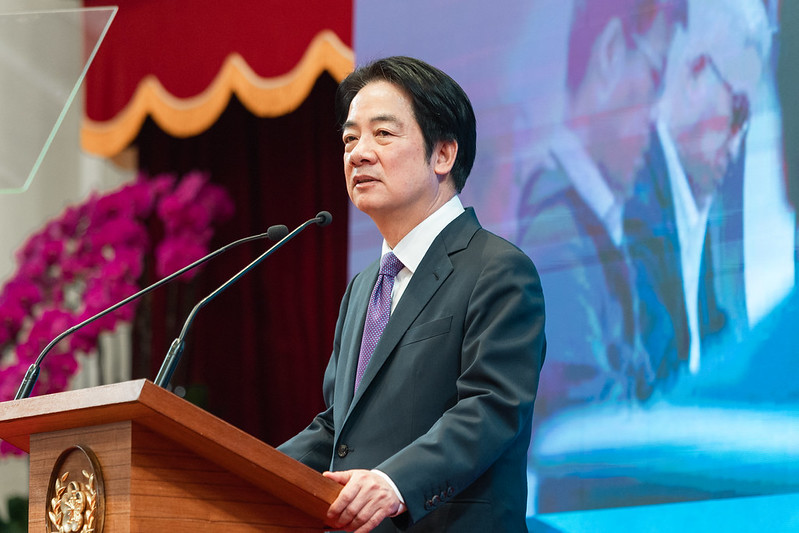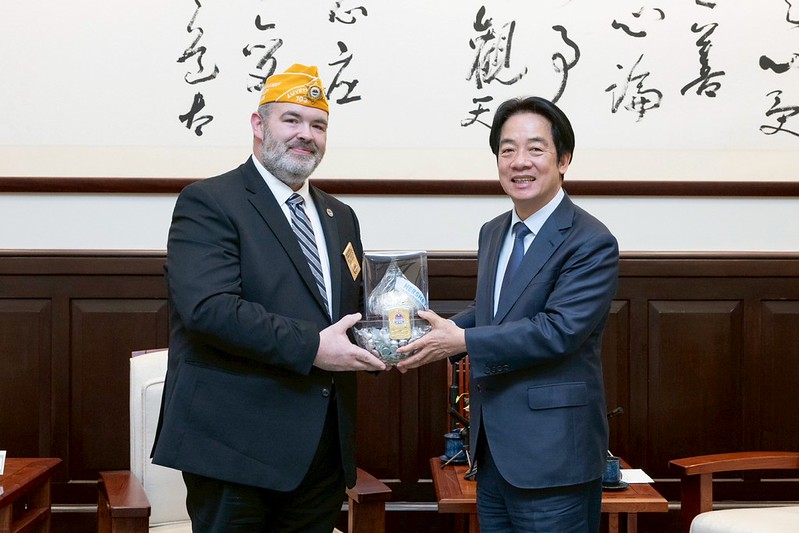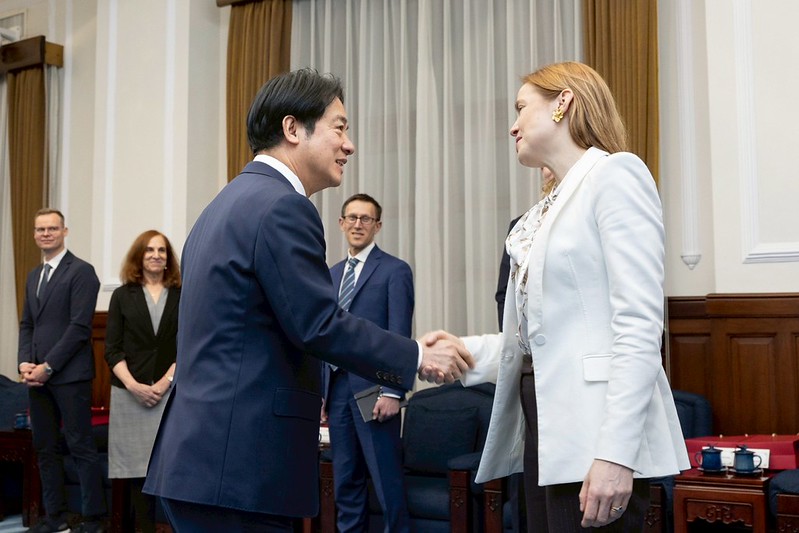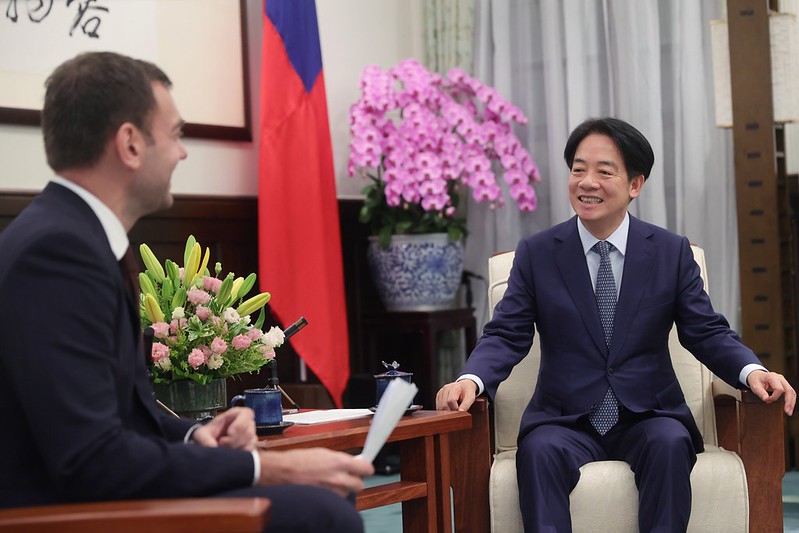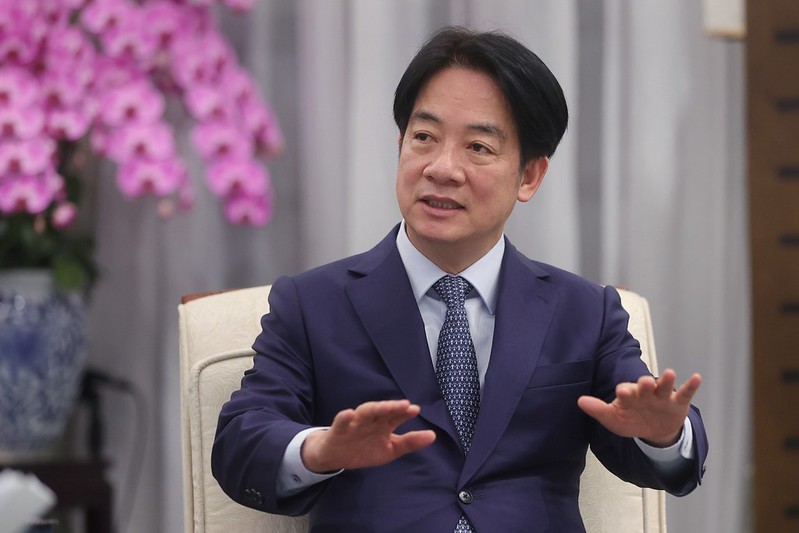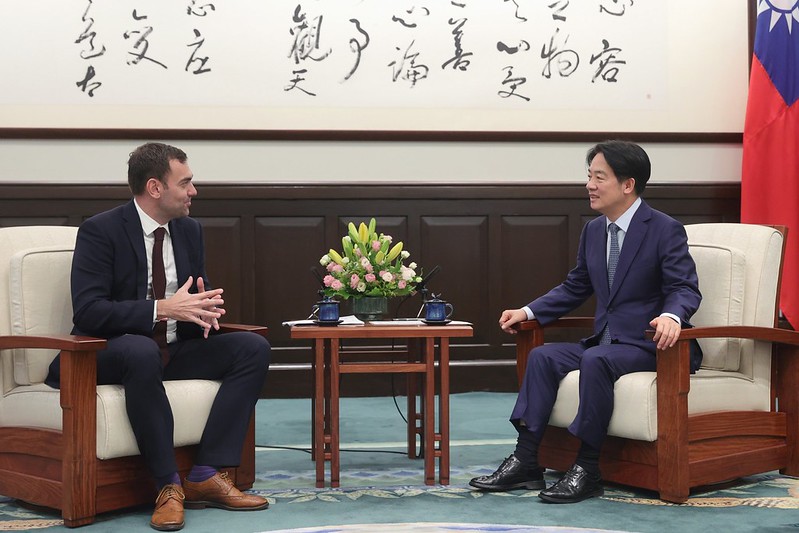News & activities
 News releases
News releases
In a recent interview with Time magazine, President Lai Ching-te responded to questions regarding diplomacy, cross-strait relations, the semiconductor industry, and Taiwan’s domestic economic development.
Following is the text of the questions and the president’s responses:
Q: Thank you so much for sparing us the time today and congratulations on your election victory. How are you settling into the new job? I know you’ve just moved one level down from where you were previously, but I hope that your access to bubble tea has not been adversely impacted by the new job.
President Lai: My interest in bubble tea has not changed. The transition into my new job has also been steady, having just moved from the fourth to the third floor. I had previously served as a legislator, premier, and was vice president for four years, so I have a clear understanding about national policies and the direction of former President Tsai Ing-wen’s past governance. So far, it has been very smooth. Thank you.
Q: Obviously you’ve had four months now since your election victory to prepare for this role. How have you spent that time and what advice has [former] President Tsai given you about taking the most important job in Taiwan?
President Lai: Over the past four months, the most important task was the transition process with former President Tsai. This included foreign affairs, national defense, cross-strait affairs, and key domestic issues. Some of this took place in meetings at the Presidential Office and some at military facilities and different government agencies.
I also worked to assemble a cabinet, inviting Cho Jung-tai (卓榮泰) to be premier. Cheng Li-chiun (鄭麗君) was invited to serve as vice premier, and former National Development Council Minister Kung Ming-hsin (龔明鑫) as secretary-general of the Executive Yuan. Premier Cho has invited people based on talent across political affiliations to form the cabinet. So far, the public response has been positive.
As for advice and encouragement from former President Tsai, she emphasized to me that the president’s job is to safeguard the country and uphold the constitutional system of freedom and democracy. Second, we must listen to public opinion and take care of the people. Third, faced with difficult challenges, we should collectively discuss a course of action forward. This way there will be less headwind.
Q: Speaking of headwinds, it was just 48 hours after your election victory that Beijing announced that one of Taiwan’s diplomatic allies, Nauru, was now going to switch recognition to Beijing. This seems to be quite a clear signal to you before you’d even stepped into office or made any policy decisions or anything. How concerned are you by Taiwan’s dwindling recognition on the world stage?
President Lai: We cooperate with our diplomatic allies in a sincere way, holding to the principles of mutual benefit and reciprocity. We cherish our friendships with our diplomatic allies and thank them for voicing support for Taiwan in the international community, as well as creating greater international space for us. We also greatly value the cooperation projects we have with our diplomatic allies because these help the people of both countries.
Taiwan has always held firm to these principles, regardless of which political party is in power. In the case that our diplomatic allies decide to switch allegiances to the People’s Republic of China (PRC), while we wish them well, such harmful actions by the PRC will not affect Taiwan’s status as a beacon of freedom and a bastion of democracy in the world. So, [on this issue of recognition], we are not deeply worried.
Q: You chose and invited Bi-khim Hsiao to be your vice president and she left Washington, DC, where she was serving as your de facto ambassador to the US. Does that signify that US-Taiwan relations are going to take on newfound importance for your administration?
President Lai: During Vice President Hsiao’s term as ambassador to the United States, she performed exceedingly well. Taiwanese society has recognized her as amongst the very best within our ambassadors to the US. The international community, including the US, has also recognized her outstanding performance. Now as vice president, she can support the new administration in furthering trusted channels with the US, which will help advance our bilateral cooperation. With Bi-khim’s support, we will engage in more substantive cooperation on national security and defense, the economy, and other substantive exchanges. I trust that we will make much progress, as Bi-khim has been instrumental in bridging Taiwan together with the US.
Q: In your inauguration speech, you called for resumption of cross-strait dialogue, trade, and educational exchanges but caveated that on dignity and equivalence. What exactly do you mean by dignity and equivalence with the PRC?
President Lai: First, the PRC should recognize that the Republic of China (ROC) exists. They should be sincere in building exchanges and cooperation with the popularly elected and legitimate government of Taiwan. Second, each issue should be mutually beneficial and reciprocal. For example, if Taiwan allows tourists to go to China, they should allow tourists to visit Taiwan. And if we let our students go to China, their students should be allowed to come here. Third, as we conduct exchanges and cooperate with each other, we should share a common conviction to enhance the well-being of people on the two sides of the Taiwan Strait, working toward an objective of peace and mutual prosperity.
Q: Also, in your speech, you said that the ROC and the PRC are not subservient to each other. That obviously provoked a reaction from Beijing. We saw the military drills but also some of your political opponents here have said that this undermines the strategic ambiguity which has been the bedrock of peace and stability. How do you counter that? Do you think that you were unnecessarily provocative in hindsight?
President Lai: What I said was the truth. Moreover, I was not the first person to express this truth. My intention was not to provoke. During her 2021 National Day Address, former President Tsai said as part of her Four Commitments that the ROC and PRC should not be subordinate to each other. Former President Ma Ying-jeou had also once said the ROC is a sovereign and independent state and that neither side of the strait is subordinate to the other. Third, I stated this in accordance with Articles 2 and 3 of the ROC Constitution, given that in Taiwan we have had our own citizens, land, sovereignty, and government for decades. According to international law, we are already a sovereign and independent country. My goal is to bring the people of Taiwan together.
Q: In April, US Secretary of State Antony Blinken traveled to Beijing and met with Xi Jinping. From diplomatic sources, he became quite animated when discussing the status of Taiwan and US support for Taiwan. Do you worry that President Xi is becoming emboldened and impatient about resolving the so-called Taiwan issue?
President Lai: Peace and stability across the Taiwan Strait are indispensable elements of global peace and prosperity. In my inaugural address, I told the international community that I would uphold former President Tsai’s Four Commitments. We will neither yield nor provoke. We will maintain the status quo and fulfill our responsibilities. I also urge President Xi to understand that conflict in the Taiwan Strait and disruptions to peace and stability in the Indo-Pacific region will not be accepted by the international community. I invite President Xi to jointly shoulder with us the responsibility of maintaining peace and stability, building regional prosperity, and advancing world peace.
Q: Since we last spoke, China’s economic problems continue to mount. Do you feel that this makes Taiwan more vulnerable, or is this an opportunity for further engagement for mutual benefit?
President Lai: I have always believed that a stable China leads to a safer Taiwan. A prosperous Taiwan can also bring about progress in China. Therefore, I do not wish to see growing difficulties in China’s economy or its society become more unstable. Indeed, economic relations between Taiwan and China are the result of divisions of labor within global supply chains. In the past, China was the world’s factory as well as the world’s market. Many countries, including Taiwan, invested in manufacturing in China and sold products manufactured at home via China to the entire world.
But today things have changed because China’s business environment has worsened. China has placed ever stricter controls on the free market. They have adopted a policy of placing state-owned businesses first, at the expense of the private sector. China’s intellectual property rights protection has also long fallen short of international expectations.
In addition, China’s military expansionism in the East and South China Seas has impacted regional peace and stability. This is why capital investment from Taiwan and other countries is no longer heading to China at the pace it was in the past. Taiwanese companies have pulled out of China’s manufacturing sector en masse, favoring countries in the Indo-Pacific – including Japan – the US, and Europe.
In 2010, investments in China accounted for 83.8 percent of Taiwan’s total foreign investment, meaning that for every NT$100, NT$83.8 was invested in China. During the same period of time, over half of Taiwan’s foreign trade was dependent on China. Parts and equipment produced in Taiwan were sent to China for assembly or used in the production of other goods, and then the finished products were sold internationally.
Last year, investment in China accounted for only 11.4 percent of Taiwan’s total foreign investment, dropping from 83.8 percent. Taiwan’s foreign trade with China also fell from its previous high of over 50 percent, totaling 35.5 percent in 2023. Despite this, Taiwan’s economic growth rate has averaged 3.15 percent over the past eight years – ranking first among the Four Asian Tigers. During former President Tsai’s eight-year term, the stock market grew by 155.5 percent and its value increased 1.8-fold. When former President Tsai first assumed office, the stock market was a little over 8,000 points; it has now surpassed 20,000 points. In other words, even as China’s economy has continued to decline, Taiwan’s economy has continued to grow and has not been affected by China. Taiwan’s new government is willing to assist China and advance peace and prosperity across the Taiwan Strait.
Q: Obviously Taiwan is central to global supply chains when it comes to semiconductors, producing 90 percent of the most advanced chips, but US export restrictions are preventing those chips from going to China. You mentioned that Taiwanese investment in China is plummeting. At the same time, Taiwan companies like TSMC are benefiting from billions of dollars from the US Chips Act. Do you fear that key players in Taiwan’s business industrial base moving closer to the US and being kept apart from China is increasing the risk of conflict?
President Lai: In this era of smart technologies, semiconductors have become crucial industrial products. In the future, if all aspects of life – including food, clothing, housing, and transportation – are to be technologically advanced and intelligent, semiconductors will be indispensable. The industry runs on a global division of labor. From research and development, design, manufacturing, raw materials, and equipment, it is a worldwide industrial chain. Taiwan is involved in integrated circuit design, wafer manufacturing, and end-of-line packaging and testing, but raw materials are distributed across other countries. For example, components, equipment, and technology are sourced from the US, Japan, and the Netherlands. As we can see, this is an industry with a global division of labor.
Although Taiwan has an advantage in the semiconductor industry, Taiwan also has a responsibility to promote global prosperity and development. Consequently, if semiconductor companies, including Taiwan Semiconductor Manufacturing Company (TSMC), decide to expand in the US, Japan, Europe, or other countries consistent with their own business interests, the government will respect their decisions.
Geopolitical changes will continue to impact the distribution of semiconductor companies. Given that the restructuring of global supply chains is not specific to any single country, I do not believe that this will increase the risk of conflict.
Q: Your only trip to China was in 2014 when you were serving as mayor of Tainan. I understand that you had some quite open and frank discussions with students in Shanghai about Taiwanese aspirations for independence. What did you learn from that interaction?
President Lai: In 2014, I visited Shanghai because the Tainan City government organized a traveling art exhibition to commemorate the 120th anniversary of Chen Cheng-po’s (陳澄波) birth. During my interactions with the Shanghai municipal government and Fudan University, I made it clear that the two sides of the Taiwan Strait should seek common ground and set aside differences. Through exchanges and cooperation, we should promote mutual understanding, empathy, reconciliation, and peaceful development.
Q: You won the election with over 40 percent of the vote, but the DPP lost control of the legislature, and so you need to work across the aisle with opposition parties to get your domestic agenda across. It’s not been a very harmonious time in the Legislative Yuan at the moment. We’ve seen brawls and a lot of sniping over the new bill to increase scrutiny of the executive branch. How confident are you that you can overcome these differences to have a constructive relationship with the opposition parties?
President Lai: I remain fully confident about the future development of Taiwan. This is because of our democracy. After decades of collective effort, as well as the numerous sacrifices and contributions of many people, the vitality and values of democracy are deeply imbued within the Taiwanese people. These democratic values are an important foundation as I promote future national policy priorities.
In my inaugural address, I mentioned that a divided legislature is the will of the people. This provides an opportunity for each party to share their ideas and jointly bear the responsibility of serving the nation. At the same time, if any one party does not live up to public expectations, I trust that people will respond accordingly so that the country can still move forward.
In my address, I also pointed out that Taiwan will continue to move in the direction of democracy, peace, and prosperity, linking us with the international community. I will pursue policies that further entrench Taiwan’s democracy, maintain regional peace, and allow Taiwan to engage with the international community to enhance global prosperity and development. This roadmap will benefit both our country and its people. I do not think opposition parties will strongly oppose bills related to this roadmap.
Q: Some of your DPP colleagues have pointed out that 17 KMT lawmakers went to China recently and met with Wang Huning, and they have openly accused the KMT of being a fifth column for the CCP in trying to disrupt your administration. Is that an opinion that you share?
President Lai: In a democratic society, the interests of the people should take precedent; this is the principle of democracy at work. As a result, political parties should put national interests above their own – that is their sacred duty . As Taiwan faces different forms of pressure from China, everybody, regardless of party affiliation, should put the people first and prioritize national interests. They should not let themselves be influenced by any authoritarian country.
Q: The CCP has refused to engage with your administration or the DPP. Is it beneficial for the KMT to have trips to China and engagements with China, whether it’s Ma Ying-jeou on an unofficial basis or KMT lawmakers?
President Lai: The people of Taiwan and all political parties – regardless of affiliation – should recognize and respond to the fact that China’s ambition to annex Taiwan is part of their national policy. Only by coming together domestically and strengthening our global linkages can we maintain our sovereignty, freedom, and democratic way of life. By doing so, we will have the capacity and opportunity to determine our own future. No political party should sacrifice national sovereignty for political gain.
Q: Following the devastating Hualien earthquake just a month ago, China offered to send aid to Taiwan but was rebuffed. You hadn’t taken office at that point. But do you feel that was the right decision? Do you think it could have been an opportunity to mend bridges across the strait?
President Lai: Taiwan very much cherishes the expressions of concern and support we received from the global community. International assistance creates a positive feedback loop that helps us come together in times of need. This helps support global development and stability.
With this being said, at the time, China had offered 100 prefabricated homes, which was not what the people affected by the Hualien earthquake required. When central Taiwan was struck by a major earthquake on September 21, 1999, the government had provided such homes to alleviate housing shortages at the time. However, over the past 20 or 30 years, Taiwan has accumulated greater experience and capacity for search and rescue and post-disaster reconstruction. We have moved past the period of requiring prefabricated housing.
Today, if a home is made unsafe by an earthquake, a red notice will be attached to the structure. We will consequently provide financial support for both the property and its reconstruction. If people need to live in a hotel or guesthouse, stay with a relative, or rent a place to stay, these costs will also be subsidized until the home has been rebuilt. Therefore, we did not require prefabricated homes. People living in hotels or guesthouses also supported the tourism industry, which was affected by a large drop in visitors following the earthquake.
Q: Some in the opposition want to restart negotiations for the cross-strait service trade agreement for close economic integration with China. Why do you oppose such a move?
President Lai: In short, the time for this has long passed. As I said, many Taiwanese businesses have left China. Looking ahead, we can see substantive differences opening up between Taiwan’s economy and China’s present economic structure.
If the cross-strait service trade agreement were passed, Chinese business owners could come to Taiwan and set up shop with as little as NT$6 million dollars. And it is not just a matter of the owners – they could also bring employees over. This would greatly affect Taiwan’s local economy.
Q: Beijing is aggressively courting the Global South to back its claim over Taiwan with 28 nations, according to recent reporting, firmly supporting China’s push for reunification. How important is it to win the argument over Taiwan’s right for autonomy amongst the international community, especially those of the Global South?
President Lai: I hope that all countries will respect the choice of Taiwan’s people. The will of the people should not be subject to decisions made by a majority or show of hands [in international fora]. Neither should our people be threatened by violence or the threat of war.
China is presently engaged in lawfare, which is affecting support for Taiwan internationally. While Taiwan will do its best to speak up for our own rights and interests, I hope that the international community will also continue to assist, understand, and support Taiwan. This is because if China’s attempts at lawfare were to succeed, this would affect Taiwan’s global backing, be it in times of peace or war.
Q: Domestically in Taiwan, a lot of Taiwan people are struggling with a growing but slow economy, rising prices, and stagnated wages. What is your plan to try to help the average Taiwanese person?
President Lai: I have been deeply focused on supporting the salaries and lives of our grassroots workers. I also prioritize reducing the gap between the rich and poor, as well as efforts to give our young people a brighter future. I will faithfully implement the Minimum Wage Act that was passed under former President Tsai. With this act, minimum wage increases will be based on how the GDP or prices increase. More importantly, we must help our industries upgrade and our economy transform.
In my inaugural address, I said that economic development will take a threefold approach. First, we will have a clear view for a smart, sustainable future. In other words, we must use technology to address climate change and respond to the global era of smart technologies. We will have an innovative economy and create a new Taiwan that is both smart and sustainable.
Second, we will expand the space industry, exploring the future by developing medium- and low-orbit communications satellites and drones. We will also use our strengths as a maritime nation to explore the ocean, helping related industries grow and develop in many directions.
Third, we will help our enterprises expand their presence and markets internationally. We will improve Taiwan’s investment environment and take care of our small- and medium-sized enterprises while helping our industries in their global reach. This will grow Taiwan’s economy, leading to development and creating an environment conducive to higher wages.
During my election campaign, I put forward a National Project of Hope. With this, we will invest more in our society, take better care of both young and elderly people, as well as all those who need care. We will close the wealth gap, while supporting the people’s welfare and the future of our young people.
Q: President Lai, thank you. You’ve been very generous with your time. But just to end off, we spoke before how you grew up in Wanli in a poor family and your father died when you were very young. You worked very hard to become a doctor and your mother wasn’t very keen about you taking a diversion route into politics. Now you’ve reached the very top of the political ladder in Taiwan, do you think that your mother would be proud, that she would have forgiven you for defying her?
President Lai: My mother was just an ordinary person and, like many mothers in Taiwan’s society at that time, worked hard, took care of her family, and hoped that her children would grow up safe and sound. What probably mattered most to my mother was that I was safe and healthy. It did not matter to her whether I became a politician or not, just as I had no expectation that one day I would sit here in the Presidential Office.
In fact, when I was little, I hoped to become a doctor so as to take care of the sick, relieve suffering, and save lives. But during the process of Taiwan’s democratization, many young people devoted themselves to politics, including myself. I had no idea that I would continue down this path, much less be here today.
My mother told me that if people support me, then I should run for election; if not, then I should continue as a doctor. In other words, my mother felt that I probably would not pursue politics for very long. We were from the countryside and did not come from a political family.
However, I attribute my success to Taiwan’s democratization. If it were not for the sacrifices, contributions, and achievements of countless individuals up until now, I could not have been afforded the opportunity to sit here. My responsibility is to further deepen Taiwan’s democracy and enable hardworking people from all walks of life to realize their ideals and contribute to our country.
